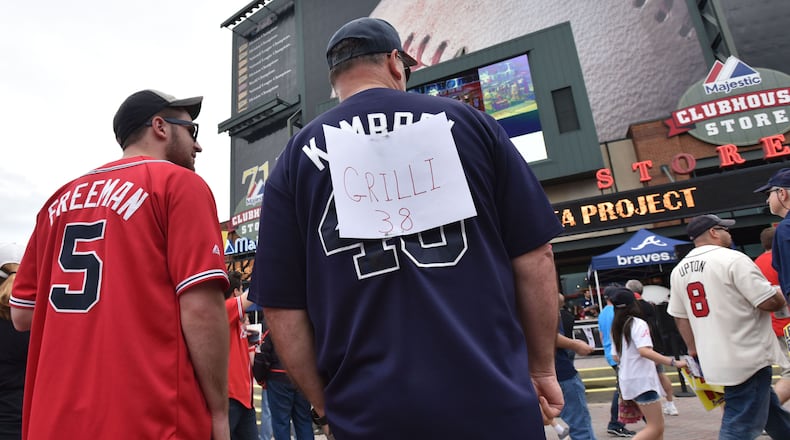Even in the spring, baseball’s all business.
The Braves have been movers and shakers before Opening Day many a time. Here are just five hardball moves Atlanta has made before the regular season start:
Sanders becomes a Brave
After weeks of negotiating in the early spring of 1991, the Braves added Deion Sanders, a cornerback for the Atlanta Falcons, fulfilling his dream to “play professional baseball and football on the same field.”
Sanders earned a $250,000 base salary and an additional $450,000 in incentives for appearing in 57 games with the New York Yankees the previous season.
Sanders had sought a two-year deal that would run concurrent with his deal with the Falcons. He was pursuing a baseball commitment to extend from spring training through July 31 and a guaranteed spot on the major-league roster.
The Braves gave Sanders a $500,000 signing bonus and a one-year, $150,000 minor league contract.
A month after signing his two-year deal Sanders arrived at camp a day early, proclaiming, “This is a sign of total devotion.”
“I’ve never taken baseball as seriously as I should have. But not anymore. And how am I going to do that? By spending extra time in the batting cage, extra time with the hitting coach and so on.”
He hit .277 with 22 homers while stealing 75 bases in 292 games for Atlanta before being traded to Cincinnati in 1994.
John Smoltz holds out
An angry John Smoltz missed a portion of the Braves’ 1991 spring training camp because of dissatisfaction with his contract.
Smoltz, the team’s winningest pitcher over the previous two years, was seeking a raise from $247,500 to $450,000, but instead learned the club was renewing his contract for $360,000.
“I’m very, very unhappy with my situation,” he told the AJC from his condo in West Palm Beach, Fla. “I’m just so frustrated with the whole contract thing.”
General manager John Schuerholz made it clear that “negotiations are over with John. John’s only option is to go back to work.”
Smoltz did, eventually. He went 14-13 with a 3.80 ERA in 229-2/3 innings that season.
The following year, the future Hall of Famer’s salary jumped to $1.6 million. He would earn as much as $14 million in 2004, his final season with Atlanta.
Horner walks away
Bob Horner entered the 1986 season in the final year of a four-year $5.5 million contract.
Braves owner Ted Turner said before spring training that he had every intention of re- signing Horner, the 1978 Rookie of the Year. General manager Bobby Cox spoke with Horner in spring training but no deal was reached after Horner turned down what he thought were low-ball offers from the Braves.
The third baseman played in 141 games and became the 11th player in major league history to hit four home runs in a game. And then he walked.
Horner became a free agent in 1987 and went to Japan, signing a one-year deal for $2 million.
That year, is was found that major league clubs colluded to keep down salaries. Some 17 years later, Horner received more than $7 million from a lawsuit the players filed against the owners.
Center fielders swap
Five months after losing the 1996 World Series to the New York Yankees, the Braves sent two thirds of their outfield in a salary dump move to Cleveland.
On March 25, 1997 — one week before Opening Day — the Braves sent outfielders David Justice and Marquis Grissom, to the Indians for Kenny Lofton, considered the best leadoff hitter in baseball at the time, and relief pitcher Alan Embree.
It was not general manager John Schuerholz's favorite deal to make.
The move made room for Jermaine Dye and Andruw Jones in the Braves’ outfield. It also shaved $7.7 million in salary and luxury taxes.
Credit: Curtis Compton
Credit: Curtis Compton
Kimbrel and (Uptons) era closed
On the eve of the 2015 season, the Braves sent closer Craig Kimbrel and disappointing center fielder Melvin Upton Jr. and his burdensome contract to the Padres in exchange for Jordan Paroubeck (minors), Cameron Maybin, Carlos Quentin, Matt Wisler along with the 41st overall pick in the June amateur draft.
The deal, which reunited Melvin Upton with younger brother, Justin, was conducted under direction of Braves president of baseball operations John Hart and assistant GM John Coppolella. (Of note: The Braves acquired Justin Upton in a pre-spring training deal in 2013.)
The Padres took on $80.35 million in guaranteed salaries to Kimbrel and Melvin Upton while shedding the $24 million owed to Quentin and Maybin.
About the Author
Keep Reading
The Latest
Featured


